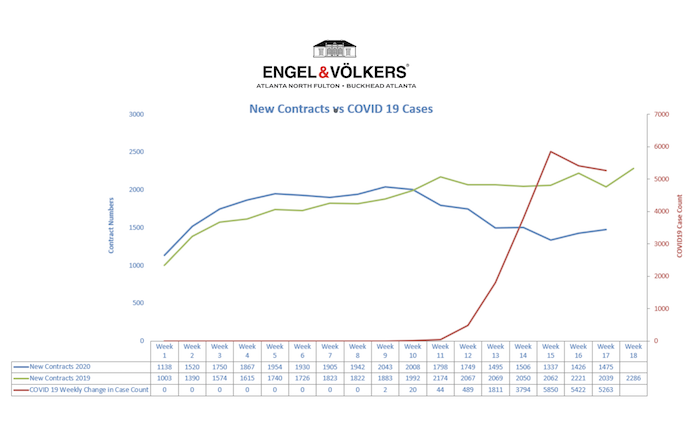
Atlanta Mayor Keisha Lance Bottoms said in an afternoon interview with The Washington Post Live that Georgia is going in the “opposite direction” when it comes to social distancing measures to combat the coronavirus outbreak.
“Our numbers are continuing to rise,” Bottoms said, noting that the latest figures show the state has 24,615 confirmed cases and 1,026 related deaths. “We are lifting our foot off the pedal and we’re not out of the woods.”
Bottoms said over the last three days, Grady Hospital has seen an increase in the number of people coming in and testing positive for coronavirus.
Bottoms said states like New York and Washington had COVID-19 figures trending in the right direction thanks to social distancing measures. “We’re going in the opposite direction,” the mayor said about Georgia.
While Atlanta has the bed capacity for COVID-19 patients, the mayor said it defied logic – and health experts – that those beds would be used by people who got sick because they were bored and wanted to go a bowling alley.
Bottoms was referencing Gov. Brian Kemp’s decision to begin reopening businesses like bowling alleys, hair salons, barbershops, massage parlors, tattoo parlors, restaurant dining rooms, and movie theaters. Bottoms said she and other Georgia mayors were not consulted by Kemp and his order to reopen businesses cannot be countermanded at the local level.
“My options and powers are limited against Gov. Kemp’s move, but I do have the authority to use my voice and encourage people to stay home,” Bottoms said as the governor’s shelter-in-place order is set to expire on April 30.
Bottoms said she understood “people who are dealing with whether or not to go back to work to put food on their table, but I don’t understand people going to a movie theater or bowling alley because they’re bored.”
“Some people are just tired of being in the house and they want to go back to life as normal – getting their nails done and a haircut,” she said. “People are making tough economic decision to stay at home and preserve their health. It’s a very difficult dynamic people are having to choose.”
Asked about the racial disparity in access to testing in Atlanta, Bottoms said there were now testing facilities in predominantly African-American communities, but the issue is the racial disparity that is impacting the state as a whole. She cited a story in the Washington Post that said African Americans accounted for more than 50 percent of Georgia’s deaths, despite making up about 30 percent of the state’s 10.6 million people.
“This virus is discriminating against people of color, because African-American communities have a higher rate of infection with underlying conditions like diabetes and high blood pressure,” Bottoms said.
The post Atlanta Mayor: State is going in the “opposite direction” on social distancing to combat COVID-19 appeared first on Atlanta INtown Paper.

 Atlanta’s local roads now have a default speed limit of 25 miles per hour after the City Council formally adopted the Vision Zero plan on April 20, which focuses on eliminating traffic deaths and reducing crashes and serious injuries.
Atlanta’s local roads now have a default speed limit of 25 miles per hour after the City Council formally adopted the Vision Zero plan on April 20, which focuses on eliminating traffic deaths and reducing crashes and serious injuries.
 Passive income is every real estate investor’s dream scenario. What could be better than reaping the rewards of smart decisions, with minimal intervention or effort? Passive income investments are therefore…
Passive income is every real estate investor’s dream scenario. What could be better than reaping the rewards of smart decisions, with minimal intervention or effort? Passive income investments are therefore… Another reason the market has remained healthy, according to Stephens, is that the residential real estate industry was deemed an essential service, and quickly put new procedures and tools in place to allow buyers and sellers to safely conduct real estate transactions. Online home sales information was already available, but real estate professionals augmented and strengthened online information, and buyers were advised to begin their home search virtually. Sellers were advised how to best showcase their homes’ features via video, drone footage and professional photos. Agents made sure the homes they represented were thoroughly disinfected before and after every showing, and often, turned lights on and off and opened doors for their clients to further safeguard the spreading of germs. Contract signing can be done with social distancing and client-agent conversations are easy to accomplish by phone or teleconferencing. The numbers show that buyers continue to feel confident as they look for homes and sellers feel confident putting their homes on the market.
Another reason the market has remained healthy, according to Stephens, is that the residential real estate industry was deemed an essential service, and quickly put new procedures and tools in place to allow buyers and sellers to safely conduct real estate transactions. Online home sales information was already available, but real estate professionals augmented and strengthened online information, and buyers were advised to begin their home search virtually. Sellers were advised how to best showcase their homes’ features via video, drone footage and professional photos. Agents made sure the homes they represented were thoroughly disinfected before and after every showing, and often, turned lights on and off and opened doors for their clients to further safeguard the spreading of germs. Contract signing can be done with social distancing and client-agent conversations are easy to accomplish by phone or teleconferencing. The numbers show that buyers continue to feel confident as they look for homes and sellers feel confident putting their homes on the market.